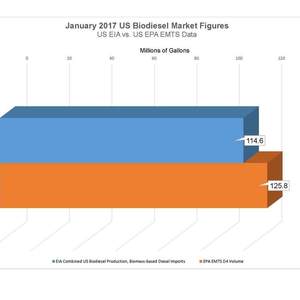EIA releases US biodiesel production, import data for January

Source: US EPA EMTS, EIA data compiled graphically by Ron Kotrba, Biodiesel Magazine
April 3, 2017
BY Ron Kotrba
The U.S. Energy Information Administration released its data on biodiesel production and import volumes for January. U.S. production of biodiesel in the first month of 2017 was 93 million gallons, according to EIA data collected through its monthly biodiesel production survey. This figure does not include domestic renewable diesel production.
Biodiesel production in January was down 51 million gallons from December, not atypical when comparing production for the last month of a year during which the $1-per-gallon biodiesel blenders tax credit is in effect to the first month of a year in which the incentive is lapsed.
Combined U.S. imports of biodiesel and renewable diesel in January totaled more than 21.5 million gallons, according to EIA data. This includes 10.12 million gallons of biodiesel from Argentina (nearly 6.1 million gallons) and Canada (more than 4 million gallons), and nearly 11.5 million gallons of Neste renewable diesel from Singapore. In December, biomass-based diesel imports broke records totaling more than 135 million gallons (112 million gallons of biodiesel and 23.4 million gallons of renewable diesel). Last year, U.S. imports of biomass-based diesel surpassed 915 million gallons.
Advertisement
Advertisement
U.S. EPA’s EMTS production figures for January show nearly 126 million gallons of biomass-based diesel generating D4 RINs under the RFS program was manufactured domestically and abroad. When EIA’s combined production and import volumes for January, which total approximately 114.5 million gallons, is compared to EMTS figures, there is not much discrepancy between the two agencies’ data, considering EMTS data include renewable diesel produced from two plants in Louisiana and EIA domestic production data do not.
Advertisement
Advertisement
Related Stories
Biodiesel capacity in the U.S. and Canada dipped slightly stable in 2024, with several renewable diesel producers reporting headwinds and lower margins alongside a drove of SAF projects in various stages of development.
The IEA’s Task 39 group has new research regarding the development and status of the sustainable aviation fuel industry.
Montana Renewables LLC has delivered its first shipment of 7,000 gallons of SAF to Dearborn, Michigan's Buckeye Pipeline facility. From there, the fuel will be transported to the Detroit Metropolitan Airport via pipeline for use by Delta Air Lines.
NYC took a monumental step towards clean air and a sustainable future on Jan. 11 with the grand opening of the city's first retail fuel station dispensing renewable diesel. The project is a collaboration between Sprague and Sonomax.
The USDA on Jan. 11 awarded $19 million under the Higher Blend Infrastructure Incentive Program. The grants will support projects in 22 states to expand the availability of higher ethanol and biodiesel blends.
Upcoming Events










